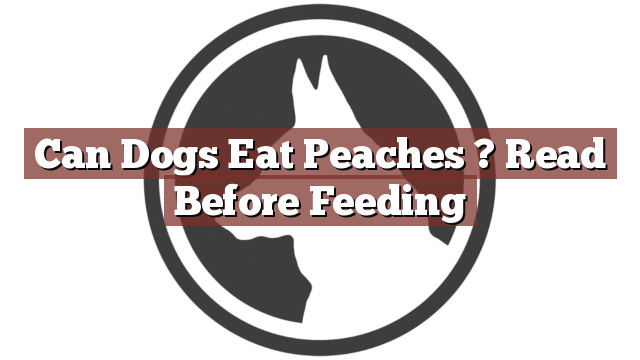Understanding Your Dog’s Dietary Needs
As a responsible pet owner, it is crucial to understand your dog’s dietary needs. While dogs are omnivores and can consume a variety of foods, not all human foods are safe for them. It is important to provide them with a balanced diet that meets their nutritional requirements. Feeding your furry friend foods that are unsuitable for their consumption can lead to digestive issues, allergies, or even poisoning. Therefore, it is essential to be aware of what foods are safe for dogs and what foods should be avoided.
Can Dogs Eat Peaches? Read Before Feeding
Can dogs eat peaches? This question often arises when dog owners are enjoying this delicious fruit and want to share it with their furry companions. The answer is yes, dogs can eat peaches, but with some important considerations. Peaches are packed with essential vitamins and minerals that can benefit your pooch’s overall health. They contain vitamins A and C, which are beneficial for their immune system and promote healthy skin and coat. Peaches also contain dietary fiber that aids in digestion and can help prevent constipation in dogs.
However, it is important to note that moderation is key when it comes to feeding peaches to your dog. Feeding them excessive amounts of peaches can lead to an upset stomach or diarrhea due to their high sugar content. Moreover, avoid giving them canned peaches as they often contain added sugars or syrups that can be harmful to dogs. Always opt for fresh, ripe peaches and remove the pit, as it can pose a choking hazard or cause intestinal blockage.
Pros and Cons of Feeding Peaches to Dogs
Feeding peaches to your dog has its pros and cons. On the positive side, peaches can provide your furry friend with essential nutrients like vitamins A and C, as well as dietary fiber. These nutrients can support their immune system, improve their digestion, and promote a healthy coat. Additionally, peaches are low in calories and can be a healthy alternative to processed dog treats.
However, it is important to be aware of the cons as well. While peaches can be a healthy addition to your dog’s diet in moderation, they should not replace their regular meals. Dogs have specific dietary requirements that are best met through a balanced dog food. Furthermore, some dogs may be allergic to peaches or develop an adverse reaction to them. If you notice any signs of an allergic reaction such as itching, vomiting, or diarrhea, it is best to discontinue feeding peaches and consult your veterinarian.
Conclusion: Considerations for Feeding Peaches to Your Dog
In conclusion, dogs can eat peaches, but it is important to consider a few key points before including them in your dog’s diet. Moderation is vital, as excessive amounts of peaches can cause digestive issues. Always opt for fresh, ripe peaches and remove the pit to prevent any potential health hazards. Additionally, it is crucial to monitor your dog for any adverse reactions or allergies when introducing new foods into their diet. As always, if you have any concerns or questions about your dog’s diet, it is best to consult with your veterinarian for personalized advice and guidance. By taking these considerations into account, you can safely share this tasty fruit with your furry friend and ensure their well-being.
Thank you for taking the time to read through our exploration of [page_title]. As every dog lover knows, our furry friends have unique dietary needs and responses, often varying from one canine to another. This is why it's paramount to approach any changes in their diet with caution and knowledge.
Before introducing any new treats or making alterations to your dog's diet based on our insights, it's crucial to consult with a veterinarian about [page_title]. Their expertise ensures that the choices you make are well-suited to your particular pet's health and well-being.
Even seemingly harmless foods can sometimes lead to allergic reactions or digestive issues, which is why monitoring your dog after introducing any new food item is essential.
The content provided here on [page_title] is crafted with care, thorough research, and a genuine love for dogs. Nevertheless, it serves as a general guideline and should not be considered a substitute for professional veterinary advice.
Always prioritize the expert insights of your veterinarian, and remember that the health and happiness of your furry companion come first.
May your journey with your pet continue to be filled with joy, love, and safe culinary adventures. Happy reading, and even happier snacking for your canine friend!

